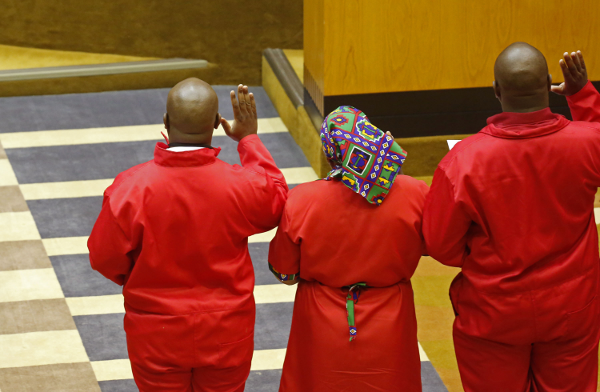“But the EFF has a militant culture within the party? Worse, this militancy is potently hyper-masculine. Is this not behaviour we’ve seen fascists display before?” are questions that are often posed in response to the actions of the Economic Freedom Fighters.
Militancy as a political aesthetic does not originate with fascism and is not unique to it. The EFF are enthused by an outmoded style of far-left liberation politics. In presentation they draw from past struggles for decolonisation and socialism in Cuba, Zimbabwe and Vietnam etc. The militancy is a consequence of a leftist culture steeped in actual revolutionary war. The language deployed by the EFF reflects the same culture. But it isn’t a cause for serious concern. Unlike Fidel Castro or Thomas Sankara, the EFF are not involved in revolutionary conflict. They are actors within a constitutional democracy and must function within those constraints. Their militancy is anti-establishment theatre and not political strategy. Our institutions have continually reprimanded the organisation and punitively acted against them — particularly our courts and civil society.
What’s often overlooked is that many political parties indulge in militancy (the ANC and Inkatha Freedom Party are examples) because we are a post-colonial nation, ruled by a former liberation movement. Colonisation and decolonisation are both incredibly violent phenomena. In conducting the struggle against apartheid, organiations like the ANC used multiple methods, assuming the role of a social movement through strikes or protests while also having a military wing (uMkhonto we Sizwe). This style of politics remains alive today. Both the EFF and the ANC frame their objectives as conventional demoratic governance and transformative struggle — utilising militant language.
What should be questioned is whether this militancy is still useful or necessary? If not, what new political aesthetic can mobilise citizens? This important discussion is avoided by uninformed name-calling.
The militant manhood embraced by the EFF can also be seen across our political landscape. Not only among the parties of parliament but among some student leaders at universities. To call it a fascist impulse is simplistic. Militant masculinity is the hybrid child of a generally patriarchal culture in South Africa fused with a manhood forged by liberation struggle politics. Apartheid and colonialism were often viewed as deeply emasculating of African men (they were). In reaction to white supremacy’s emasculation, black men doubled down on their masculinity in an attempt to rejuvenate a lost sense of sovereignty.
Such militant manhood must be relegated to the past. Through this form of masculinity, the EFF contributes to the suppression of women’s agency and voices in politics in and out parliament. Labelling this fascist means we miss the opportunity to have a crucial discussion about the damaging presence of corrosive manhood in our formal and grassroots politics.
Fascists dream of conquest
A salient and definitive feature of fascism is a zealous nationalism. Here the demand is that one not only have immense pride in their nation but that one must be willing to submit their entire being towards the nation. For the fascist, their nation in its value and importance stands above all others. Moreover, its glory must be made real no matter the cost. Such nationalism catapulted the imperialism of pre-World War II Japan and post-Cold War America, resulting in invaded countries (Iran, Afghanistan and the Persian Gulf) and millions of dead civilians. The EFF has never expressed ambitions to conquer and wage war against other states — through economic or military means. More importantly we’ve witnessed the organisation explicitly and consistently speak out against the xenophobic nationalism in the country. Secondly the organisation participates in efforts to make tangible the values of Pan-Africanism, which don’t entail war mongering.
Among young, left-leaning activists, the stern criticism of our post-apartheid order sometimes manifest as rejections of patriotism, South African exceptionalism and xenophobic nationalism.
Violence as the status quo
And what of the political violence? Adam Habib was not alone in his fierce disapproval at the EFF’s national protest against Clicks. I share his disapproval but not the hyperbole he uses to condemn the party. Fascists often see the gathering of power in a ruthlessly utilitarian way. Violence is a tool to be used to amass power often in a calculated, organised manner, without restraint by law or democratic principles. The EFF and young radical activists have engaged in violence and aggression that is despicable, and deserving of legal punishment. But they are not comparable to the violence we have seen from fascists of the past and present.
Such as the Christchurch Mosque shooter, whose fascist fear of Muslim immigration resulted in his killing 51 people. The Sturmabteilung, the original paramilitary wing of the Nazi party in its rise to power was tasked with the persecution of ethnic minorities, intimidation and harrassment of trade unions and disruption of organising by opposing political parties.
Liberals are quick to be repulsed at the EFF’s undemocratic antics and yet rarely show outrage or demand collective action against the systemic violence which sustains our political order. Whether it be evictions of the poor conducted by the City of Cape Town, political assassinations and police brutality exploding underneath the watch of the ruling party or exploitative, inhumane work conditions and labour relations sustained by the corporate sector.
The greatest threats to democracy are collectives of elites who unjustly hold concentrated power against the vulnerable. Again liberals see the work of individuals and not the damage done by systems. It is under these conditions that a party like an EFF can flourish in the first place. And simplistic understandings of such an organisation allow their crude “left-wing” populism to thrive.



